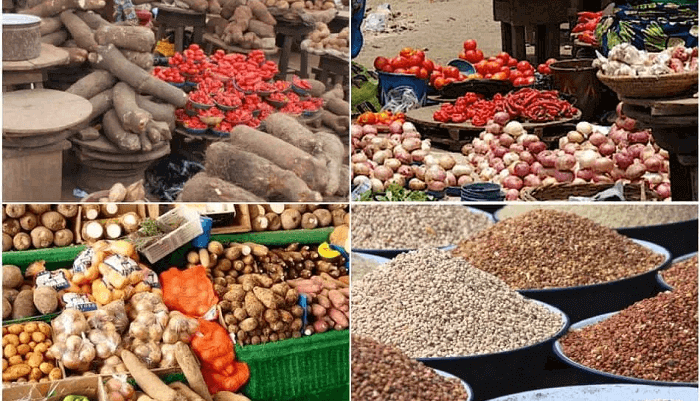The prices of staple food items are continuing to fluctuate across various states in the country, according to findings by our correspondents.
While some states are recording a noticeable price reduction, others are experiencing stagnation or increases, despite federal efforts to intervene.
Earlier this month, President Bola Tinubu directed a Federal Executive Council committee to implement urgent measures aimed at further reducing food prices nationwide.
The Minister of State for Agriculture and Food Security, Senator Aliyu Sabi Abdullahi, disclosed this directive at a capacity-building workshop for Senate correspondents. He said the focus is on ensuring the safe passage of agricultural produce across transport routes to reduce logistics costs.
Nigeria has been grappling with deepening food insecurity since the removal of fuel subsidy, which significantly increased transportation costs. Worsening insecurity on major highways has also continued to disrupt the smooth movement of goods across the country.
Despite interventions, food remains unaffordable for tens of millions of Nigerians.
To address this, the government is preparing to roll out a Farmer Soil Health Scheme to boost productivity, alongside a cooperative reform initiative to mobilise resources and empower rural farmers.
“Mr President has shown tremendous interest in the cooperative sector as a veritable tool for resource mobilisation, economic activity generation, and improving the livelihoods of members,” Abdullahi stated.
In his June Democracy Day speech at the National Assembly, President Tinubu reiterated his administration’s commitment to achieving food sovereignty, citing the ‘Nigeria First’ policy as a cornerstone of market-driven economic growth.
Jigawa State: Prices Are Crashing by 45%
In Jigawa State, food prices are crashing by nearly 45% compared to the same period last year.
At Shuwarin Market, one of the state’s major weekly markets, a mudu (local measure) of beans is now ₦2,500, down from ₦5,000 last year. A 50kg bag of local rice is going for ₦50,000, compared to ₦85,000 previously.
Millet has dropped from ₦3,000 to ₦1,000 per mudu, while maize is now ₦1,200, compared to ₦2,700 last year.
In Dutse, the Jigawa State capital, farmers are expressing concern that they are being forced to sell their produce at a loss due to falling market prices.
Muhammad Lawan, a maize farmer, said: “A bag of maize is going for ₦30,000, but our cost of production is higher than that. If this continues, we won’t be able to farm next season.”
Local traders say buyers are benefiting from the drop, but the producers are the ones absorbing the shock.
Niger State: Grain Prices Are Halving
In Niger State, the prices of grains are continuing to drop — down by 50 per cent compared to the same time last year.
A survey by LEADERSHIP Weekend in Minna and surrounding areas reveals that rice is now selling at ₦1,600 per mudu, down from ₦3,000. Maize has dropped from ₦1,500 to ₦700, and prices have remained stable over the last three months.
Rukaiya Abdul, a housewife, said this level of price stability hasn’t been seen in years.
“Today with ₦5,000 you can get five sizeable tubers of yam. Before now, that could cost as much as ₦20,000,” she added.
Farmer Ahmed Abubakar warned, however, that while prices are dropping, farmers are incurring losses.
“Input costs are still high. Without government support, the current price crash is harming producers. During the full harvest season, prices might fall even further,” he explained.
Abia State: Garri, Rice, Beans Are Getting Cheaper
Across Abia State, most food items are becoming more affordable compared to the past four to six weeks. Garri has fallen from ₦90,000–₦95,000 to ₦55,000–₦60,000 per bag. Beans dropped from over ₦200,000 to ₦120,000–₦130,000. Local rice (100kg) is down from ₦180,000 to ₦110,000. Nigerian foreign rice (59kg, destoned) is going for ₦68,000–₦70,000, down from ₦85,000–₦90,000. Foreign rice (50kg) is now ₦105,000–₦110,000, compared to ₦130,000–₦140,000 earlier.
The prices of sweet potatoes and palm oil have also dropped slightly.
Yam prices, however, are still fluctuating between ₦2,500 and ₦5,000 per tuber depending on size.
Further reductions in prices are being anticipated as supply from the Middle Belt begins to enter the market.
According to Mr Clement Nnaji, a major food distributor: “For now, we are relying on South-East farmers. Once more yams and grains come from Benue and Nasarawa, we expect prices to drop further.”
However, he expressed concern that poor road infrastructure and insecurity on highways could hinder the anticipated reductions.
Kaduna State: Gradual Price Reductions Noticed
In Kaduna, prices are slowly coming down across markets as a result of federal government measures.
At the Television Market, trader Joy Ashibi confirmed the trend: “A mudu of rice was ₦2,200–₦2,300. Now it’s ₦1,900–₦2,000. Old maize was ₦800; it’s ₦650 now. New maize is ₦500–₦550.”
Restaurant owner Adams Sunday, who operates along Sabon Tasha Expressway, also acknowledged the drop in prices.
“Rice bags I used to buy for ₦80,000–₦90,000 now go for ₦60,000–₦65,000. A bag of beans is ₦105,000. New maize is ₦30,000.”
However, yam remains relatively expensive.
“Five small tubers cost ₦5,000. A big one is between ₦1,300 and ₦1,500,” said Shehu Lamido, a yam seller.
Anambra State: Beans, Rice Falling; Yam, Oil Are Soaring
In Anambra State, the prices of beans and rice are going down, but yam and palm oil are becoming more expensive.
Chief Uzodinma Eze, a trader at Eke Awka Market, reported: “A bag of beans I sold for ₦180,000–₦230,000 last year is now ₦100,000–₦120,000. Local rice has dropped from ₦48,000–₦50,000 to ₦38,000–₦40,000.”
However, palm oil prices are rising sharply.
Mrs Linda Ukwueze noted: “A 25-litre container I bought for ₦55,000 last year now goes for ₦70,000.”
Osun State: Food Prices Are Dropping Slightly but Not Uniformly
In Osun State, the prices of staple food items are showing mixed trends, with some coming down slightly while others remain high.
At Akindeko Market in Osogbo, rice, maize, and beans are seeing modest reductions, but yam and palm oil are either stable or rising slightly.
A trader, Mrs Funmilayo Ayeni, said: “A mudu of rice that used to be ₦2,300 is now ₦2,000. Beans have reduced from ₦2,500 to ₦2,100 per mudu. But yam prices are not changing much. A medium-sized tuber still sells for ₦1,200 or more.”
Another trader, Mr Sulaimon Adeyemi, noted that the reduction is being driven by increased supply due to the harvest season, but insecurity and high transportation costs are preventing prices from falling significantly.
Delta State: Price Declines Not Consistent
In Delta State, the situation is also varying by commodity and location.
At Ogbogonogo Market in Asaba, some food prices are decreasing, while others remain high.
Trader Mrs Juliet Okonkwo stated: “We are seeing a slight reduction in rice and maize, but palm oil and yam are still expensive. A 25-litre keg of palm oil is now ₦68,000, up from ₦60,000 some weeks ago.”
Consumers like Mr Kingsley Anene say they are hoping for further reductions soon, especially as schools are resuming and household expenses are increasing.
Plateau State: Yam and Maize Still Expensive
In Plateau State, the prices of some staples are remaining high despite harvest season.
At Terminus Market in Jos, a trader, Mrs Amina Danjuma, said: “Yam is still expensive. Five tubers of medium size cost ₦7,000. A bag of maize is selling for ₦45,000, though it was ₦60,000 a few weeks ago.”
She noted that insecurity in farming communities and rising transportation costs are still keeping prices up.
Kebbi State: Prices Are Reducing, But Challenges Remain
In Birnin Kebbi, there is a noticeable reduction in food prices, but traders and farmers say the cost of agricultural inputs is still high.
According to Alhaji Bala Gwandu, a grains dealer, “Prices are dropping because harvest is ongoing. A 100kg bag of local rice is now ₦60,000, down from ₦85,000. Millet and guinea corn are also reducing in price.”
He warned, however, that without input subsidies or better logistics, food prices could climb again after the harvest season ends.
Imo State: Price Reductions Are Being Seen, But Not Across All Items
In Imo State, traders report that some staple foods, such as beans and rice, are reducing in price, while others like yams and oil remain high.
At Relief Market in Owerri, Mr Chibuzor Umeh, a foodstuff trader, said: “A bag of beans is now ₦120,000, down from ₦200,000. Rice is reducing slightly, too. But yams and palm oil are still expensive.”
Shoppers like Mrs Theresa Onuoha said they’re buying in smaller quantities now and are adjusting their diets.
Kano State: Mixed Trends Are Continuing
In Kano, food prices are continuing to fluctuate with no clear downward trend in some markets.
Traders at Dawanau International Market confirmed that while some prices are easing due to new harvests, insecurity and fuel costs make transport difficult.
Malam Musa Aliyu, a wholesaler, said: “Maize is coming down. A 100kg bag is ₦42,000, compared to ₦55,000 before. But rice and beans are not reducing much.”
He urged the government to do more to support both farmers and transporters.
EKITI : Divergent Views On Prices
Residents of Ekiti State have expressed divergent views over the present prices of food items in the state.
To some of them, price of some of food items have slightly reduced, for some, prices are stable while some others say food prices have kept rising.
Speaking to LEADERSHIP Weekend in Ado Ekiti, the state capital, a housewife, Mrs Adenike Ajayi said the food items with slight price reduction are rice, beans and garri.
Ajayi said, “By this time last year, if I am not mistaken, a small bucket of rice was sold for N3500, beans (white/red) between N3000 and N5000, garri between N700 and 1000, a bag of rice and beans were close to N90,000 but now, there have been reduction of over 40 percent on almost all the food items.”
A market survey carried out by our showed that a bag of foreign rice is sold at N67,000, a bag of local rice N52,000, a small container of foreign rice N2,500, and N2200 for local brands.
A farmer, Mr Olakunle Adeyanju , said there is no doubt about the fact that food prices have reduced, but that the reduction is minimal.
“The food prices could have gone down drastically but for the high cost of transporting from the farm to the market or wherever the consumers are. This is the reason why government must ensure that the price of fuel is reduced to the barest minimum,” he said.
Also, a market woman, who simply identified herself as Mrs Jayeoba said though the price of bag of rice and other foodstuffs have slightly reduced, a majority of the people can’t still afford them.
“How many people can boldly say they that they do buy bag of rice in their house, if not the wealthy people. It is still out of the reach of the common man who only go for tins or rubbers of rice. Before the coming of immediate past federal government, you could still get a bag of rice for less than N10,000. Almost every household could afford it then. It will be good if such good time can return to Nigeria.”
In her contribution, the chairman, Trade Union Congress (TUC) in the state, Comrade (Dr) Omotola Farotimi agreed that food prices were coming down.
She said, “Looking at increasing price of goods generally, though inflation rate is on high side, food items price in particular is now stable and reducing, compared to last year.”
We’ll ask for Living Wage – Labour
Plateau State chairman of the Nigeria Labour Congress (NLC), Eugene Manji, has expressed readiness to seek renegotiation of the minimum wage considering the high cost of living in the country.
According to him, given the current economic realities and rising costs of foodstuff, they are pushing for a substantial increase in the minimum wage.
Manji further argued that they want a living wage that takes into account the high cost of foods, transportation, accommodation, school fees, and healthcare.





